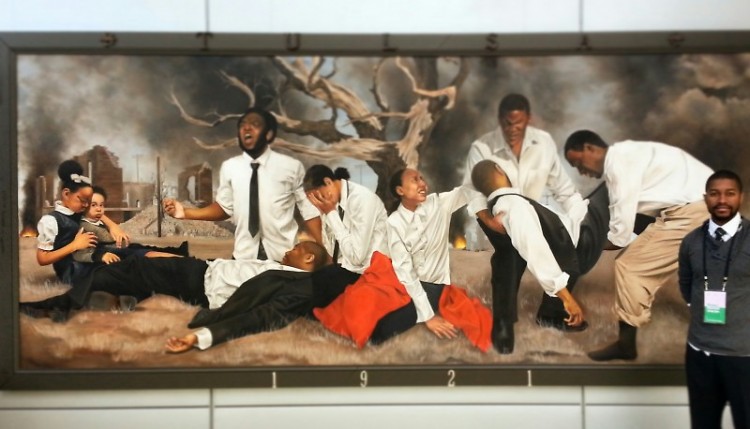Reflecting the Times: Arts and Activism
Critical Discourse
Panel Discussion
7 p.m. - 8 p.m.
ArtPrize HUB
41 Sheldon Blvd SE
Grand Rapids, MI

"In A Promised Land..." painting by Shawn Michael Warren, showing at Devos Place /Shawn Michael Warren
On Friday October 2, from 7 p.m - 8 p.m. the topic of "Reflecting the Times: Arts and Activism" will be addressed by a panel of arts experts in front of an audience as part of the Critical Discourse series at the ArtPrize HUB (41 Sheldon Blvd SE).
ArtPrize Director of Exhibitions, Kevin Buist, reached out to Taylor Aldridge and Jessica Lynne, co-founders of ARTS.BLACK, and proposed they lead the discussion. ARTS.BLACK is a digital space devoted to being a constructive and safe environment for writers of the Black diaspora to practice and publish their work.
“[Buist] wanted to facilitate a discussion that responded and explored the way artists have been responding- or not- to current social justice movements, particularly around police brutality and the ongoing extrajudicial killings of Black people,” say Aldridge and Lynne.
Aldridge and Lynne were happy to accept creative freedom to navigate the course of this discussion. Rooted in a belief that art is powerful and can be an element in generating change.
“[To] break systemic oppressions rooted in racism and class inequities, civic engagement must be paired with aesthetic to influence effective change in society,” the co-founders say.
For this panel discussion, they chose to feature artists who not only create phenomenal artwork but also “partner with communities and individuals affected by societal injustices to create change.” Joining the ARTS.BLACK co-founders to take the discussion deeper will be Suhaly Bautista-Carolina, also known as “The Earth Warrior;” an artist and Engagement & Education Manager at the public nonprofit arts institution, Creative Time, in New York City and Dread Scott, a revolutionary New York City artist who has consistently throughout his broad career illuminated social injustices in a manner that creates dialogue and affects actual change.
Similar to the mission of ARTS.BLACK, this Critical Discourse will gather the voices of Black artists, activists and scholars to build a discussion that illuminates social issues.
“Art cannot replace good old fashioned organizing and strategizing. However, art can shed light on the erasure of marginalized individuals and groups, encourage change in the social and political environment and spark conversations around injustices and inequities that need to be rectified,” say the co-founders.
Born in New York with Dominican heritage, Bautista-Carolina is an environmental activist, traveler and visual storyteller. She earned her artist name “The Earth Warrior” for her focus on the defense of the environment while studying at NYU, where she was named one of “NYU’s 15 Most Influential Students.” Currently The Earth Warrior is exploring themes of power, womynhood and existence in her photographic practice.
The Earth Warrior is an Executive Board Member of FOKUS (Fighting Obstacles Knowing Ultimate Success), an arts advocacy organization designed to “educate, empower and unite communities through the arts,” that produces Insight Magazine quarterly. The publication is meant to provide insight into those artists who do not immediately come to mind when thinking about the arts including culinary artists, industrial designers, actors, musicians and emerging artists.
In 2014 The Earth Warrior joined the team at Creative Time as a Site Manager for "Funk, God, Jazz and Medicine: Black Radical Brooklyn," a walkable month-long exhibition consisting of four art commissions inspired by a community of free and formerly enslaved Black citizens. The community-based projects were inspired by radical local battles for land and dignity from the 1960’s to present day that involve the claiming and holding of a neighborhood.
Panelist Dread Scott works in a range of media including performance, photography, screen printing, video, installation and painting.
“I make revolutionary art to propel history forward,” he says in his artist statement. The most infamous example of the social impact of his artwork was President George H.W. Bush's reaction to Scott’s installation, "What is the Proper Way to Display a U.S. Flag," who called it “disgraceful.” This eventually resulted in the landmark First Amendment decision in a Supreme Court case passing legislation to “protect the flag.”
Scott’s work consistently conjures potent emotive images, like burning or walking on the American flag, burning money on Wall Street or naked Black men being guarded by German shepherds. Scott engages audiences to participate in these kinds of scenarios in major museum galleries as well as street corners. While testing formal and conceptual boundaries, Scott’s art engages with difficult social issues that confront our communities.
Scott’s broad range of artwork is unified by the attention brought to the misery that society creates. He often invites the viewer to picture how the world could be. Scott’s work is on display at the Whitney Museum of American Art, in "America is Hard to See," from May 1 – September 27, 2015.
ARTS.BLACK suggests a couple texts to consider for thinking deeper about these issues:
"9.5 Theses on Art and Class" by Ben Davis
A critic and organizer, Davis understands the role of art in within the broader scope of activism and offers comprehensive analysis of capitalism, historic and contemporary art theory, and more.
"Between the World and Me" by Ta-Nehisi Coates
Writer and cultural critic, Coates shares his experiences of being a Black Body in America as a political act. He employs his literary work to interrogate historical and current systems of racial oppressions via The Atlantic.
The Rapidian, a program of the 501(c)3 nonprofit Community Media Center, relies on the community’s support to help cover the cost of training reporters and publishing content.
We need your help.
If each of our readers and content creators who values this community platform help support its creation and maintenance, The Rapidian can continue to educate and facilitate a conversation around issues for years to come.
Please support The Rapidian and make a contribution today.